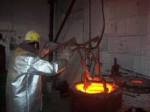reposted from Aug. 1, 2011
“The ability to extract wisdom from experience is a skill honed in the crucible”. (p. 109, Leading for a Lifetime by Bennis).
“Seeking God in the crucible of ministry”. (from the tagline of Strengthening the Soul of Your Leadership by Barton).
This summer the word crucible has been floating around me– in a conference seminar I attended, in the Barton’s book about soul leadership, in scripture (Prov. 27:21–we are tested in the crucible of the words say about us) and in my own spirit.
A crucible is defined as:
 1. A vessel made of a refractory substance such as graphite or porcelain, used for melting and calcining materials at high temperatures.
1. A vessel made of a refractory substance such as graphite or porcelain, used for melting and calcining materials at high temperatures.2. A severe test, as of patience or belief; a trial.
3. A place, time, or situation characterized by the confluence of powerful intellectual, social, economic, or political forces
Leadership and intensity go hand in hand. I am learning (which is super obvious on further reflection) that leadership is not about if you find yourself in a crucible, but is about the constant crucibles of heat, testing, social and political forces, and my own emotional and spiritual tensions. And as I look to the future, I am growing in awarness that as I grow in leadership, the stakes only go up, the crucibles only become more intense.
In its the crucibles of ministry and leadership that you change. Crucibles can become defining moments of transformation that we most likely on realize after time has given us the opportunity to see the experience as a whole. According to Bennis and Thomas in their book Leading for a Lifetime, what sets people a part is how they respond to the crucible. The ability to emerge from a time of crucible and to learn from it and to grow in wisdom and experience does not happen to everyone, or perhaps to many. The practice of a reflective life is to find meaning from the experience and to integrate that meaning into purpose and vision.
Bennis and Thomas call this our adaptive capcacity. Our ability to change.
Ruth Haley Barton speaks of going to the bottom of our souls–to the place beneath the surface where our demons lurk. Crucibles of ministry and leadership bring forth our demons more than perhaps anything else in our lives. Barton says that in order to become who we are created to be as leaders, we must give space and attention to our shadow sides. We must look our jealousy, our fear, our anxiety dead in the face. We even embrace the reality of ourselves, knowing that we–just as we are–are precious to God, in both our shadow and our light. As Merton talks about, it is only in loving the poverty of ourselves that we begin to understand the love of God for us in our humanity. When we know what lies beneath, we are able to release ourselves to a deeper place. We are able to change through the Holy Spirit. We have adaptive capacity.
Teaching others to learn the art of reflection is one of the great gifts of being a pastor and a leader. I have been thinking about how we teach this gift (even as I am learning it). Cultivating a reflective life is a challenging task in our world that lives without margin. More on that later…

No comments:
Post a Comment